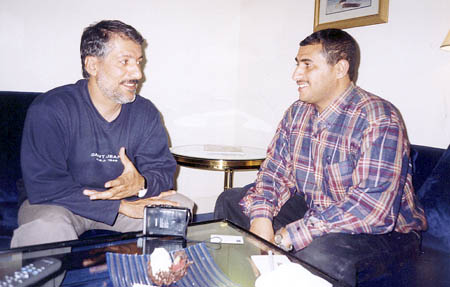The European Vision for the Middle East [Archives:2001/45/Law & Diplomacy]
Javier Solana,
European Union High Representative for the Common Foreign and Security Policy
After more than a year of “intifada”, successive condemnations of evermore terrible acts of violence and appeals to re-establish dialogue in favor of the resolution of conflict have met with little success.
Discouragement is precisely what those opposed to peace seek. During this time of great uncertainty, it might seem difficult to find reasons to try once again to relaunch dialogue and seek peace. Personally, I see three compelling reasons to do so: firstly, to show the continuity of our commitment; secondly, to express our understanding for public opinion at this critical juncture after the 11th of September; and thirdly, to bring back into focus a vision of peace that we have long held.
Well before the terrorist attacks in the United States and the present situation in Afghanistan, the peace process was encountering difficulties. At the present time, although it appears totally blocked, there may a small opportunity for progress. To miss it would be a grave error.
The European Union, myself and Special Representative Moratinos, have taken care to maintain permanent contact with all the main actors in the region. Our aim has been to break the cycle of violence and to limit conflict to the political arena where dialogue and negotiation prevail.
Some will say that every effort at mediation has failed. On occasions we have appeared to be on the brink of a return to a necessary degree of calm, but each time a new drama has dashed our hopes. That was the case last week with the assassination of an Israeli Government Minister and the wave of violence that followed in its wake. Nevertheless, there is no question of giving up. Several European Ministers will join in the efforts to reinforce a message shared by our principal international partners. I am back in the region this week to talk once again to Israeli, Palestinian, Jordanian and Egyptian leaders. I will explain during my meetings that we understand that their concerns are even greater than hitherto. The overwhelming majority of Arabs are opposed to terrorism. They wish simply that their identity be respected in a globalized world.
The Middle East wants peace and stability, and its people seek security and prosperity. I understand very well the insistence on security among Israelis. This insistence is expressed also by Palestinians, who wish to be able to study, work and move freely. Finally, each people require reassurance as to their acceptance by the other. This is the condition for confidence in the future.
European Union policy towards the region has always been clear. Since the Venice Summit 20 years ago, we have supported a resolution of the conflict based on an appeal for a negotiated solution, the implementation of Security Council resolutions 242 and 338 which establish the right of Palestinian self-determination – which is to say to a state – and the right of Israel to security within safe and recognized borders. EU leaders reiterated this basic position last Friday at their Summit in Ghent. President Bush, last week, also recognized the right of Palestinians to a viable state at the same time that the right of the existence of Israel be guaranteed.
Moreover, Europe remains committed to the Madrid Conference, whose 10th anniversary will soon be marked. We continue to believe that the objective of the Oslo Agreements – an agreement on final status – remains.
The immediate objective is to relaunch the peace process. A basis to do this exists which is accepted by the parties and supported by a broad international coalition for peace: the recommendations of the Mitchell Committee Report, of which I had the honor to be part. This report identifies a series of political, economic and security measures capable of bringing the parties back to the negotiating table. Efforts to reduce violence must be supported by a political perspective as well as by a relaxation of economic restrictions. How might this basis be transformed into an operational road map to peace?
The implementation of the Mitchell Report recommendations runs up against the question of the sequencing of the measures to be taken by each of the two parties. In other words, who starts and when? We need to transcend this problem. This will be possible if the parties recognize the seriousness of the situation and the consequences that will occur if it degenerates further. We Europeans are ready to help. We are ready, as we have often said, to contribute to an impartial surveillance mechanism that would allow the parties to overcome the various differences and obstacles. Such a mechanism has been proposed by the EU and also by the G8 leaders several months ago.
The Barcelona Process, which is the most solid framework that we have and which contains the clearest objectives for the development of cooperation in the Euro-Mediterranean region, including the Middle East, has greatly suffered from the Israeli-Arab crisis. The Euro-Med Ministerial meeting on 5-6 November next must be used as an opportunity to inject new dynamism, given the absolute necessity for the countries of the region to deepen co-operation among themselves and with the European Union.
After the tragic events of September 11, we must all make an effort to emerge from this difficult period more, not less, united. This requires combining all the good intentions – and there are many from within and outside the region – and isolating the others. If we are able to unite our efforts against those who want to take hostage the future of people and governments, we must work for a coalition in favor of a just peace in the Middle East.
——
[archive-e:45-v:2001-y:2001-d:2001-11-05-p:./2001/iss45/l&d.htm]


